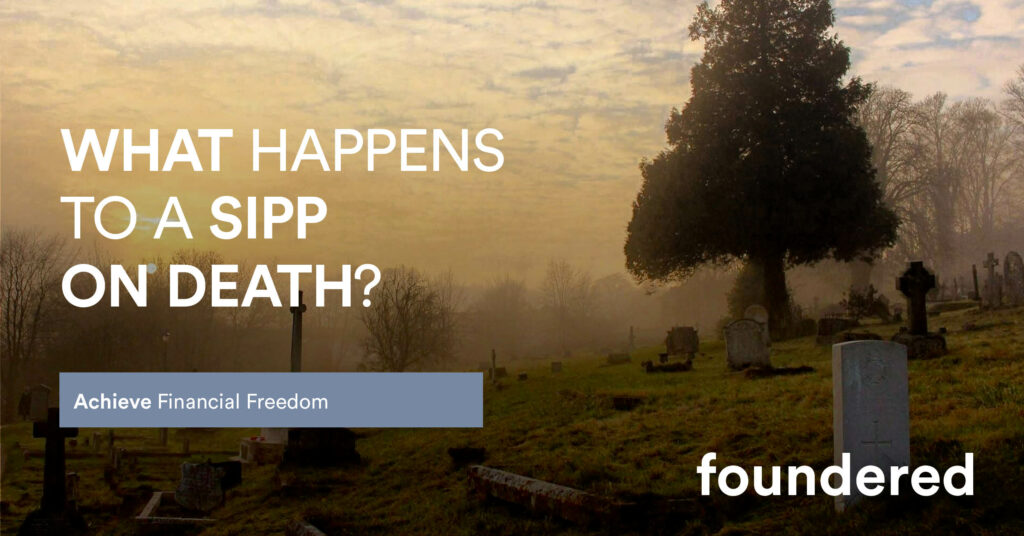When you start saving in a pension, you are often focused on the rules surrounding contributions and tax savings on the way in. A percentage will also give some consideration to the Lifetime Allowance. Lesser still will think about taxes and withdrawals that can occur once you meet the legal age to receive your personal or workplace pension. Few will think about what happens to a SIPP on death.
We don’t like to consider our own mortality. The thought that we might one day die is far from the happiest of stories. “I’m Peter Pan, I’ll live forever” is sadly not true and no matter how hard we try to manifest it, one day we’ll pass from living to the dead.

Designating a beneficiary of your SIPP on death
Right up there with planning your own funeral is planning what happens to your SIPP when you die. Detailing your beneficiaries in an “Expression of Wishes” form is one of the first things a SIPP provider requests. Why? Because it’s incredibly important.
Any of the SIPP providers I’ve worked with make it pretty easy to set up a SIPP beneficiary at time of account creation. You can name 1 or more beneficiaries to receive the proceeds of your SIPP on death. When designating a beneficiary, you can also choose the percentage value of the SIPP they are to receive.
What is a beneficiary?
A beneficiary is any person, charity, trust or organisation who may be able to receive death benefits from your pension.
Want to achieve financial independence?
You could spend the next 13 years learning about personal finance and putting your knowledge into action. Or you could take my FREE 10 day mini course and weekly emails. I’ll show you exactly how to become financially independent. My only question is, whats stopping you?
What steps do I take when someone dies?
When someone dies, you must communicate with the SIPP providers and confirm the death of the SIPP owner. They will usually request confirmation of this via a death certificate and possibly additional confirmation from the acting solicitor. Unless there are legal challenges to the estate, the distribution is done in accordance with your wishes.
Beneficiaries have 2 options to draw down their inherited pensions
Depending on the pension provider, there are 2 main options available to receive the SIPP pension balance. These options are called death benefits and include: lump sum and drawdown
Lump Sum death benefits
The beneficiaries may choose to receive their benefits as a lump sum in cash. Depending on your age at death, this may be completely free of tax.
Beneficiary drawdowns
Alternatively, the beneficiaries may choose to take drawdowns as an income. The tax status of the income will follow the same tax rules of above.
Depending on your SIPP provider, they may sell all your investments at time of confirmation of death (Vanguard) or they may leave the SIPP invested (AJBell) until you make decisions on whether or not you want to continue to tax advantage of the SIPP tax advantages.
What are the taxes to be paid on SIPP inheritances?
The taxes you pay on the SIPP death benefits (inheritance) depends on 2 factors:
- The age at which you die
- Whether or not the pension funds have been transferred to the beneficiaries name within 2 years of your death. This is called designating the funds.
If you die before age 75, and the pension has been designated to the beneficiaries within 2 years, then the funds will be paid free of tax.
The beneficiaries do not have to draw the funds within the 2 year timeframe.
If you die after 75 or if you die before 75 and the pension is not designated within 2 years of your death, the pension funds will be treated as income when drawn and taxed accordingly.
What happens to the SIPP when the beneficiary dies?
As with wills, you should always keep the beneficiaries in your SIPP accounts up to date.
Some SIPP providers allow you to designate alternative beneficiaries. In this instance, if the beneficiary has passed away before you and you have not updated the details with your provider, the SIPP or percentage of it, will be distributed to the alternative beneficiary.
If the beneficiary dies after receipt of the SIPP this will pass on to those they designate as successor. This will continue until all funds in your pension have been drawn down fully. It’s important to note that the tax treatment of the SIPP inheritance resets with each new beneficiary. If you are under 75 when you die, the beneficiary will receive the funds free of tax. After 75, they will be subject to income tax.
What happens to my SIPP if I don’t have any beneficiaries?
Naming your beneficiaries is common practice when setting up a SIPP, but it’s not a rule that you must designate one. In such an instance where you don’t have a beneficiary named in your “expression of wishes”, then your SIPP is likely to be paid out to your next of kin or dependants.
This of course may not be your preferred choice, so do make sure to fill in your beneficiaries when setting up your SIPP.
What happens to my SIPP if I die before 55?
If you die before age 55, the SIPP will be passed onto your chosen beneficiaries in accordance with your wishes.
These wishes are normally set with the SIPP provider on account creation. They can be updated at any time using an Expression of Wishes form available from your SIPP provider.
Can you inherit a SIPP?
It is entirely possible to inherit a SIPP. Anyone with a SIPP will be advised to designate beneficiaries to their pension when setting up their account with the SIPP provider.
You can designate almost anyone to inherit your SIPP. Friends, family and charities are common beneficiaries.
Within the SIPP the owner will also confirm the percentage of the SIPP they wish each beneficiary to receive.
Can I transfer my SIPP to my wife?
There is no way to transfer your SIPP to your wife’s name.
If your wife and you divorce, then it is possible that the pension pot can be split and an agreed share of the funds moved to a fund in her name.
This is a pretty extreme move, though anecdotally I’ve heard it happen. What would be better is to ensure you’re both contributing in equal amounts to your SIPPs each year. Figuring out the best way to do this is something to consider as early as possible.
Final thoughts on what happens to a SIPP on death
It’s incredibly important to understand what happens to a SIPP on death from the outset. Make sure you designate your beneficiaries early and keep this up to date if anything changes.
Previously we’ve outlined the benefits of a SIPP in your early retirement planning and within future posts we’ll look at commercial properties in SIPPs and also explain why SIPPs don’t form part of your estate and how you can maximise your inheritance planning through the use of SIPPs.
If you want to leave a comment or question below that would be perfect. Otherwise you can connect with me directly on Twitter.

